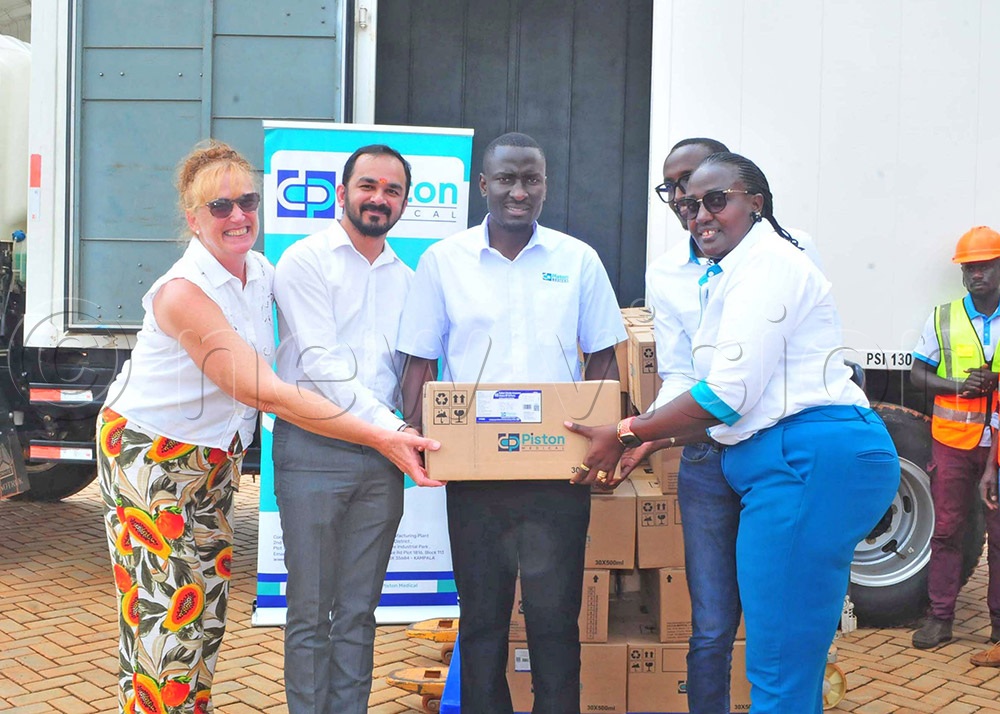Namanve pharma plant starts IV fluids production
Piston Medical Ltd, a pharmaceutical company based at Namanve Industrial Park, flagged off the start of commercial production and distribution of its first line of drugs on Wednesday, September 17, marking what stakeholders called a “critical step toward self-reliance in lifesaving medicines.”
(L-R) Olive Ainebyona, the managing Director Piston Medical Limited with Philippa Forsyth Board member Piston, Benjamin Kizza, the chief Executive officer Piston Medical, Bill Tibengana Director Piston and other staff members during the flagging off the first shipment of its medical products at their facility in Namanve Industrial Park on September 17, 2025. (Credit: Nicholas Oneal)
KAMPALA - Uganda’s health sector has received a major boost following the dispatch of locally manufactured intravenous fluids in Kampala city, based in Namanve, a move expected to ease shortages in health facilities and reduce reliance on imports.
Piston Medical Ltd, a pharmaceutical company based at Namanve Industrial Park, flagged off the start of commercial production and distribution of its first line of drugs on Wednesday, September 17, marking what stakeholders called a “critical step toward self-reliance in lifesaving medicines.”
The company, which has been working for five years to establish the plant, unveiled four products that have received pre-market authorisation from the National Drug Authority (NDA).
These include Nomosaline, Dextrose 5%, Dextrose 10%, and a Dextrose-Nomosaline combination, all commonly used for patient stabilisation and hydration in hospitals.
The company has flagged off a total of 28,000 bottles, with a target of producing up to 1.5 million bottles in the coming weeks to build adequate stock for hospitals and distributors.
Addressing a national gap
For years, health centres in Uganda have grappled with shortages of intravenous fluids, a problem that has often stalled emergency care and worsened patient outcomes.
The situation has been compounded by delays in importing supplies, leaving facilities vulnerable during surges in demand.
“Every patient admitted to a hospital will likely need some form of stabilisation before treatment,” Piston Medical chief executive officer Benjamin Kiiza said.
Adding: “These are critical drugs for resuscitation, managing dehydration, and balancing electrolytes. Having them manufactured locally gives us control over supply and ensures hospitals are not left in crisis when imports are delayed.”
According to him, Uganda’s geographical position makes it an ideal hub to serve the broader East African region with these bulky and essential products.
Regional ambitions
Although the first consignments is expected to serve Uganda’s hospitals and distributors, the company is already eyeing markets in the Democratic Republic of Congo, Tanzania, and South Sudan once regulatory approvals are secured.
For now, the focus is on saturating the domestic market and ensuring no patient goes without lifesaving fluids.
“The long-term goal is to produce as much as possible to meet national demand, and then expand into the region,” Kiiza said.
(L-R) Philippa Forsyth Board member Piston handing over the first medical supply to Prashant Dave from Shreeji Pharmaceutical with Yazidi Ndhote the commercial head Piston, Benjamin Kizza the chief Executive officer Piston and Olive Ainebyona, the managing Director Piston Medical Limited during the flagging off the first shipment of its medical products at their facility in Namanve Industrial Park on September 2025. (Credit: Nicholas Oneal)
Innovation for safety
Unlike conventional bottles currently on the market, Piston Medical’s products feature a double-cup “Eurocap” design. According to the company’s head of commercial, Yazidi Ndohte, the innovation reduces contamination risks and prevents leakage, a common issue in intravenous fluids.
“The Eurocap system means health workers don’t need to puncture the bottle, which reduces exposure to bacteria. It also addresses the problem of leaking bottles, especially for patients who are on long-term fluid therapy,” Ndohte said.
Board member Philippa Forsyth emphasised that Piston Medical had received a Good Manufacturing Practice (GMP) certificate, confirming that its processes meet global standards.
“This is not just about replacing imports. It’s about producing to the same quality standards as Europe or Asia, except that what comes out of Namanve hasn’t spent three months in an overheated shipping container,” she said, adding, “That makes it better, cheaper, and immediately available for Ugandan hospitals.”
Forsyth noted that the plant was designed with room for expansion, with plans already underway to broaden the product range and build an additional manufacturing line in the future.
As Uganda continues to battle drug shortages in many of its health facilities, stakeholders hope that local manufacturing initiatives like Piston Medical’s will transform access to essential medicines.
Background
Piston Medical Limited was officially launched in February 2025, when President Yoweri Kaguta Museveni commissioned its state-of-the-art pharmaceutical manufacturing plant in the Namanve Industrial Park.
The facility was set up with the aim of producing essential intravenous fluids and injectable medicines to reduce Uganda’s dependence on imports, strengthen the local pharmaceutical sector, and improve access to lifesaving drugs for homes and hospitals alike.
The project was supported in part by government incentives, such as provision of free industrial land and favourable tax policies, and was funded through patient capital, including backing from institutions like DFCU Bank and the African Development Bank.